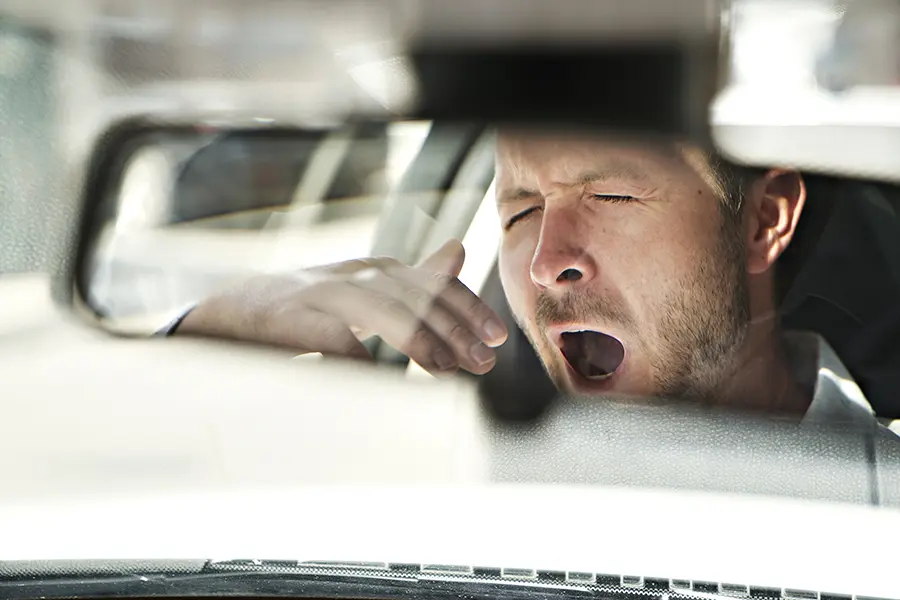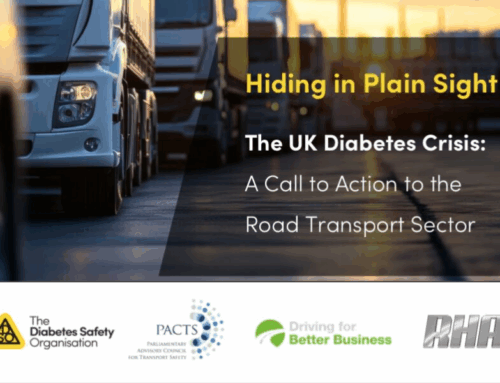Driver Fatigue – how many collisions could be avoided?
With 1 in 8 drivers admitting to falling asleep at the wheel and 1 in 5 collisions caused by driver fatigue, we talk to Lisa Artis, Deputy CEO of The Sleep Charity about the importance of quality sleep.
Sleep fulfils a vital role in keeping us healthy and happy and there is a big difference between sleep quantity and sleep quality.
Research shows that getting good quality sleep is much more important than the length of time asleep, when it comes to feeling rested, refreshed and alert – which are all qualities needed for driving. Good sleep quality is measured by how quickly you fall asleep (ideally this is within 15-20 minutes), the ability to stay asleep, waking not more than once per night and spending most of your time in bed asleep rather than awake.
Lack of sleep or interrupted sleep could be due to disruptions in life such as a new baby, busy schedules, financial worries, or stress. It could be due to sleep disorders such as narcolepsy, insomnia, or sleep apnoea. 1 in 5 people suffer some form of sleep problem which could affect their driving ability by impairing coordination, judgment ability and memory, and causing longer reaction times. It’s important that people with sleep problems and disorders seek medical assistance, as driver fatigue may affect their ability to drive safely. Whatever the reason, if sleep is being interrupted on a regular basis, it’s important that you identify what the cause of this is.
How much sleep should we have?
There is no magic number for how much sleep we should get – one size doesn’t fit all. There is a consensus that around seven to eight hours is best for adults, however, it’s important to not get too hung up on the number of hours spent sleeping. Someone may get 6.5 hours sleep a night and function perfectly well the next day, whereas other people may need nine hours a night to feel fully refreshed. Again, it’s about the quality of sleep. Quality sleep improves brain performance, mood, and health.
Everyone’s situation is different so there are many factors that affect sleep such as age, diet, general health, medical conditions, having a young family, shift work, trauma, stress and much more.
Driver fatigue – the impact on driving
Interrupted sleep is as bad for you as only getting four hours a night. Waking up repeatedly while you are sleeping disrupts your natural sleep rhythm, and leaves you with a poor attention span and a negative mood when you get up.
Sleeping for just 4-5 hours a night for a week can impair a driver’s performance to the same extent as being over the legal alcohol limit. In fact, research shows that even moderate sleep deprivation affects driving performance to the same degree as low-level alcohol intoxication.
Driving requires your eyes to be always on the road but if you’re sleep deprived this will affect how well you’re able to concentrate. The road requires your full concentration to ensure you know your speed, are aware of the road signs, and aware of other drivers, but if you’re feeling drowsy, you aren’t fit to drive. Tiredness can impact on driving ability, reaction times and judgement. It causes poor concentration, affects decision making and memory, causes increased irritability, and hostility. Sleeplessness leads to hallucinations and sensory dysfunction. Noises become louder, vision is affected, and sufferers can start to isolate themselves. Chronic sleep deprivation can lead to a mental breakdown.
One bad night’s sleep isn’t the end of the world, you may notice yourself getting grumpy and irritable with other road users, but chronic sleep debt has seriously damaging effects on our mental and physical health.
How does lack of sleep affect driving behaviours?
Lack of sleep has a direct link to our emotional and physical ability and therefore affects our moods and reactions to situations. You are more likely to get irritated quickly, have increased anxiety, be snappy, have irrational thoughts and actions, and have a general low mood. This could result in erratic behaviours and road rage incidents. A fatigued driver who is awake for 24 hours is 7 times more likely to have a vehicle incident.
You have a duty of care to your drivers to make sure they only drive when fit do so, as part of your legal road risk management responsibilities.
Peak times for fatigue related road incidents
We know that peak times for drivers involved in driver fatigue related incidents are between 0200 and 0600 and then again between 1400 and 1600. Why do these times affect us so much?
Road collisions are more likely to occur between 2am and 6am due to poor visibility, fatigue, driving home after long hours at work/travelling or following a night shift, and between 2-4pm – this time is usually a post-lunch afternoon lull, especially after a large meal or even just one alcoholic beverage, and the roads are busier.
Fatigue increases reaction time which as we know, is a critical element of safe driving. It also reduces vigilance, alertness, and concentration so that the ability to perform attention-based activities like driving is impaired. The speed at which information is processed is also reduced by sleepiness. The quality of decision-making may also be affected.
Your duty of care to your drivers
What proactive steps can organisations take to protect the health and wellbeing of their employees?
- They can minimise the chances of being in a road incident by ensuring staff are fit to drive before setting off, getting a good night’s sleep, and taking regular breaks. Employees shouldn’t begin a long journey if tired or feeling unwell.
- Although not always possible within the fleet business, they can try to avoid asking employees to drive in the early hours of the morning around 4am and after the post-lunch energy dip between 2pm and 4pm when sleep-related motoring incidents are most likely to occur.
- While it’s important to get a good night’s sleep before a long drive, it’s essential that sleep is prioritised as part of overall employee health and wellbeing by promoting exercise and healthy diet. Staying hydrated, and avoiding high carb and sugary snacks that result in an energy slump, will help to maintain focus while driving.
Helping your drivers avoid fatigue
Key guidance to a good night’s sleep includes:
- Keeping regular hours helps the body’s sleep system stay in harmony and promotes feelings of sleepiness and drowsiness when your body is ready for sleep. Therefore, where possible, wake up at the same time each morning and go to bed at the same time every night.
- Get out into natural light as soon as is practical in the morning, preferably around the same time every day. Natural light, which can still be effective on a cloudy or grey day, helps reset our internal body clock. It helps us get over feeling groggy when we have just woken up and makes us more alert.
- Keep a sleep and worry diary. Keeping a note of sleep patterns helps to identify any issues or changes. Before bed, write down any thoughts or worries that may affect the ability to fall asleep or cause you to wake in the night.
- If you spot a change in an employee, a friend or family member’s behaviour and attitude then try talking to them. These changes in mood can be minor or they may be a more serious mental health issue and they may need some support.
Whilst driving when tired is not an offence, it does increase the likelihood of drivers committing other driving related offences or causing a serious or fatal collision. Motorways and dual carriageways are the most common roads for sleep- related road incidents, due to the monotonous road environment and lack of interruptions. Crashes caused by drivers falling asleep involve vehicles running off the road or into the back of another vehicle. They tend to be high-speed impact incidents and the risk of death or serious injury is high.
Looking for info to share with your drivers? Download our Van Driver Toolkit safety card on Driver Fatigue.






